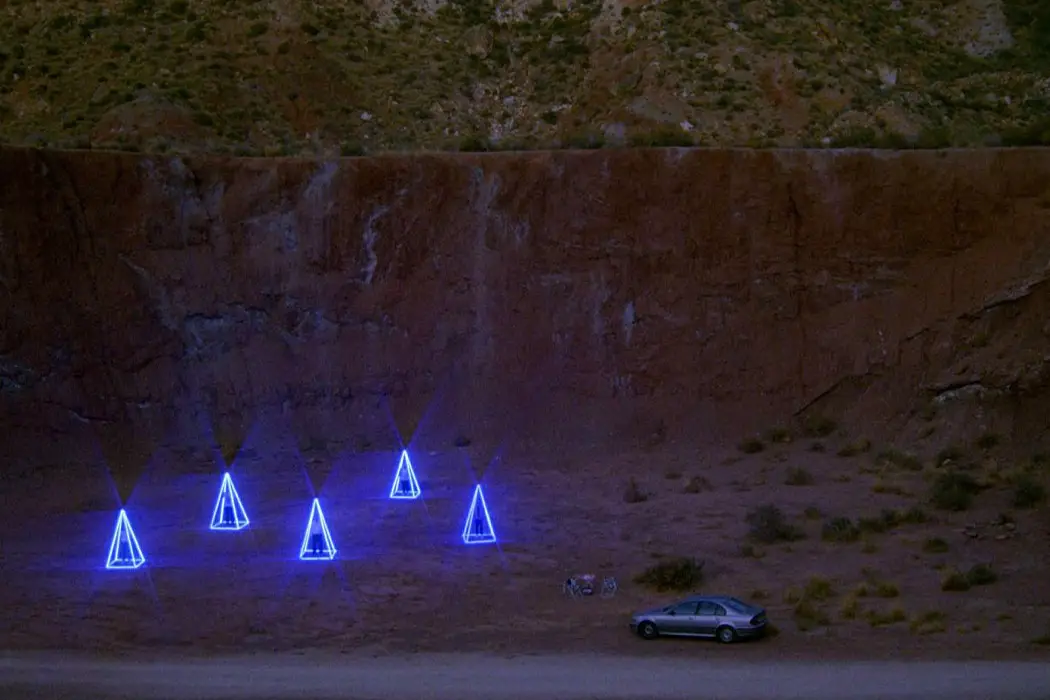The 74th Locarno Film Festival: Espíritu Sagrado

Monique Vigneault is a Mexican-Canadian film critic. She regularly covers…
Chema García Ibarra’s Espíritu Sagrado, which had its World Premiere yesterday at the 74th Locarno Film Festival, is a standout from this year’s international competition lineup—a high-camp, almost Lynchian dark comedy following a missing little girl and a sect of conspiracy theorists in small-town Spain.

Espíritu Sagrado is Ibarra’s debut feature film, a co-production between Spain, Turkey, and France, based on similar events that took place in his hometown of Elche in southern Spain. In elliptical order, we’re introduced to a series of characters: a mother on a local broadcast, searching for her missing daughter, her twin sister, and her uncle, José Manuel (Nacho Fernandez) a meek shop-owner by day and by night, a member of an extraterrestrial conspirator club, Omni-Levante.
We also have the eccentric characters in the periphery; a said-to-be clairvoyant grandmother, now handicapped by her late-stage Alzheimer’s, who covers her house with a less than tasteful Sphynx accent, and warns of a ‘Lion’s coming’. Then we have the surrounding neighbours, a woman with an eye patch who dies suddenly in a bizarre explosion, and the neighbourhood gossip who keeps watch for local crime.
These people form part of an interconnected web that eventually leads not only to a radicalized group of conspiracy theorists, but to a disturbing crime ring that covers Spain and Turkey. Espíritu Sagrado‘s subject matter gradually gets darker with lots of shock-value. What remains unclear is if the director meant to handle these heavy themes without tactfulness and more aesthetic curve, or if he really wanted to drive home the message of how easily one can descend into fantastical radicalism.

Espíritu Sagrado is a foray into the weird; at turns dead-pan and dark. One thing is for sure: this film is not for all tastes, like a Moskovich novel.
Chema García Ibarra has a unique, distinct cinematic voice and a sense for detail, both of which are quite promising and aided by DoP Ion de Sosa. He’s able to switch from schlocky Spanish wit to deft horror within the space of a frame.
At 97 minutes, the film could’ve made use of a tighter final cut. Overlong, grainy, celluloid shots really drive home the kind of look that García Ibarra aims for and carries out successfully, but where he goes wrong is in overestimating his audience’s patience.
The film flounders in its overly long crawl, but makes up for it in a repulsive final twist. All of the scattered, detailed embroideries do come together, mainly through news broadcasts, but what ensues is a sense of disgust for the worst corners of the human spirit.
All in all, Espíritu Sagrado is a hidden find for those who like distinctly original cinema that subverts our expectations of filmmaking.
Espíritu Sagrado premiered on August 11 at the 74th Locarno Film Festival.
What do you think of the first trailer for Espíritu Sagrado? Let us know in the comments below!
Does content like this matter to you?
Become a Member and support film journalism. Unlock access to all of Film Inquiry`s great articles. Join a community of like-minded readers who are passionate about cinema - get access to our private members Network, give back to independent filmmakers, and more.
Monique Vigneault is a Mexican-Canadian film critic. She regularly covers world cinema on the festival circuit.













